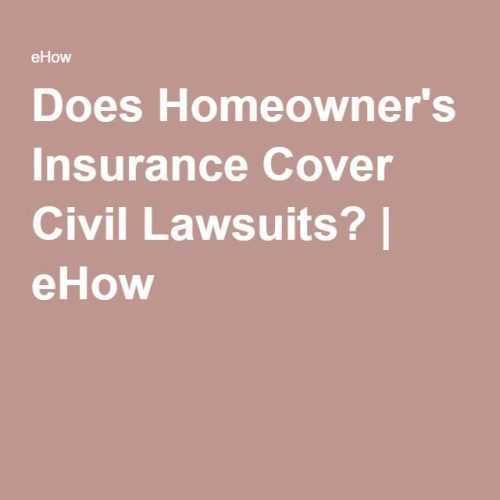
Hey there, have you ever wondered if your homeowners insurance policy could help you in the event of a civil lawsuit? Well, in this article, we’ll explore whether homeowners insurance can cover the costs of legal proceedings and any settlements or judgments that may result from a civil lawsuit. So, let’s dive in and find out!
Will Homeowners Insurance Protect You from a Civil Lawsuit?
If you own a home, you likely have a homeowners insurance policy to cover unexpected events such as property damage, theft, or liability protection in case someone gets hurt on your property. But what happens if you find yourself facing a civil lawsuit? Will your homeowners insurance policy protect you?
Understanding Liability Coverage
In the event of a civil lawsuit, your homeowners insurance policy may provide liability coverage. Liability coverage typically covers the costs of legal fees, settlements, or judgments if someone is injured or their property is damaged on your property or if you cause injury or damage off your property.
However, homeowners insurance policies have limits and exclusions. For example, if you intentionally cause harm or damage, your homeowners insurance policy may not cover you, or a limit may be imposed on the amount of coverage. Additionally, liability coverage may not apply to business-related activities or criminal actions.
It is important to review your homeowners insurance policy carefully, particularly the section related to liability protection, to ensure you understand the coverage and exclusions.
What Does the Insurance Cover in a Civil Lawsuit?
In a civil lawsuit, the plaintiff seeks financial compensation from the defendant for damages or losses incurred. The defendant’s homeowners insurance policy may cover some or all of the financial costs associated with the lawsuit, including:
Legal Fees: Your homeowners insurance policy may cover the legal fees associated with defending yourself in a civil lawsuit. This may include attorney’s fees, expert witness fees, and court costs.
Settlements or Judgments: If the plaintiff prevails in court, your homeowners insurance policy may cover the cost of a settlement or judgment, up to the limits of your policy.
When Will Homeowners Insurance Not Cover a Civil Lawsuit?
While homeowners insurance policies typically provide liability protection, there are some scenarios where the coverage may not apply.
Intentional Acts: If you intentionally cause harm or damage, your homeowners insurance policy may not cover you. For example, if you have a physical altercation with someone on your property and injure them, your homeowners insurance policy may not cover you.
Business-Related Activities: If you use your home as a place of business, your homeowners insurance policy may not cover you for events that occur during business activities. In this case, you may need to purchase a separate business insurance policy.
Criminal Activities: If you engage in criminal activities, your homeowners insurance policy will not cover you. For example, if you commit theft or arson, your homeowners insurance policy will not cover the costs associated with any civil lawsuits that arise.
What to Do if You Face a Civil Lawsuit?
If you are sued in a civil lawsuit, the first step is to notify your insurance company. Contact your insurance agent or look up the claim contact information on your policy document. Provide as much detail as possible about the lawsuit, including the date, location, and circumstances surrounding the incident.
Your homeowners insurance policy may require you to cooperate with the insurance company and their attorneys during the legal process. This may include providing statements, attending depositions, and participating in mediation or arbitration. Failure to cooperate may result in a loss of coverage.
Once you notify your insurance company, they will take over and handle the legal proceedings. They will review the details of the lawsuit and provide guidance on the best course of action.
Protect Yourself from Civil Lawsuits
While your homeowners insurance policy may provide some protection in the event of a civil lawsuit, there are steps you can take to protect yourself further.
Liability Umbrella Policy: A liability umbrella policy is an additional insurance policy that provides additional liability coverage beyond the limits of your homeowners insurance policy. This type of policy can provide protection in the event of a large judgment or settlement that exceeds your homeowners insurance policy’s limits.
Risk Management: Review your property for potential hazards that may cause injury or damage. Fix any issues immediately, and take steps to prevent future occurrences. For example, install handrails on your stairs, add non-slip mats in the shower, and install smoke detectors to reduce the risk of fire.
Be Mindful of Your Actions: Be aware of your actions and the potential consequences. Avoid engaging in risky activities that may cause harm to others or damage their property.
Conclusion
If you own a home, it is important to understand the liability protection provided by your homeowners insurance policy. While your policy may provide some protection in the event of a civil lawsuit, it is important to review the coverage and exclusions carefully. If you face a civil lawsuit, the first step is to notify your insurance company, who will handle the legal proceedings. Take steps to protect yourself from civil lawsuits by purchasing a liability umbrella policy, managing risks on your property, and being mindful of your actions.
